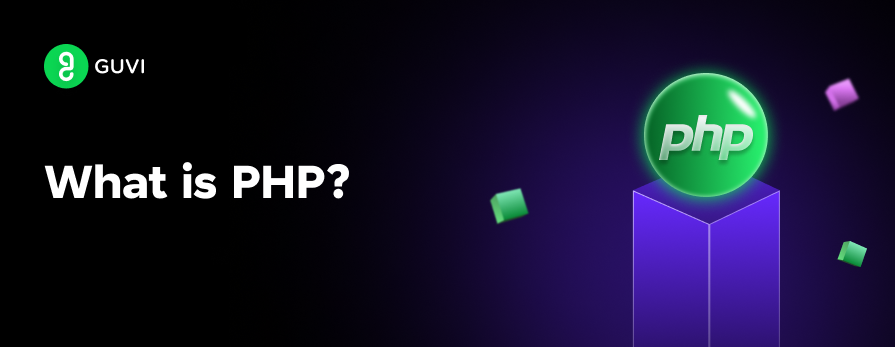
What is PHP? A Comprehensive Overview
Oct 30, 2024 5 Min Read 3183 Views
(Last Updated)
PHP stands as one of the most widely used and influential programming languages. But what exactly is PHP, and why does it continue to play such a crucial role in modern web development? In this comprehensive guide, we will learn more about PHP, exploring its history, features, advantages, and real-world applications.
Table of contents
- The Origins of PHP
- What Exactly is PHP?
- The Evolution of PHP
- Key Features of PHP
- How PHP Works
- Advantages of Using PHP
- Common Uses of PHP
- Content Management Systems (CMS)
- E-commerce Platforms
- Customer Relationship Management (CRM) Systems
- Web Applications
- RESTful APIs
- Data Processing and Analysis
- Command-Line Scripting
- PHP vs. Other Programming Languages
- PHP vs. JavaScript
- PHP vs. Python
- PHP vs. Ruby
- PHP vs. Java
- Conclusion
- FAQs
- What is PHP?
- How does PHP work?
- What are the main features of PHP?
- How does PHP compare to other programming languages for web development?
- Is PHP still relevant in modern web development?
The Origins of PHP
PHP, which originally stood for “Personal Home Page,” was created by Rasmus Lerdorf in 1994. Lerdorf initially developed PHP as a set of Common Gateway Interface (CGI) binaries written in the C programming language. His goal was to maintain his personal homepage and track visits to his online resume.
As interest in his creation grew, Lerdorf released the source code for PHP Tools in 1995, allowing users to develop their own web applications. The language evolved rapidly, with new features being added and the acronym being changed to “PHP: Hypertext Preprocessor,” reflecting its broader capabilities.
What Exactly is PHP?
PHP is a server-side scripting language designed primarily for web development. It’s an open-source language that can be embedded directly into HTML, making it easy to add functionality to web pages without needing to call external files for data.
Here are some key characteristics of PHP:
- Server-Side Execution: PHP code is executed on the server, generating HTML which is then sent to the client. This means the client only receives the results of running the script, without knowing the underlying code.
- Cross-Platform Compatibility: PHP runs on various platforms (Windows, Linux, Unix, Mac OS X, etc.) and is compatible with almost all servers used today (Apache, IIS, etc.).
- Database Support: PHP has native support for many database systems, including MySQL, PostgreSQL, Oracle, Sybase, MS-SQL, and more.
- Open Source: PHP is freely available and can be downloaded from the official PHP resource: php.net.
- Simplicity and Flexibility: PHP is relatively easy to learn, especially for developers with a background in programming. Its flexibility allows developers to write simple procedural code or complex object-oriented applications.
If you’re looking to strengthen your PHP fundamentals through self-paced learning, then GUVI’s PHP Certification Course is the right choice for you.
The Evolution of PHP
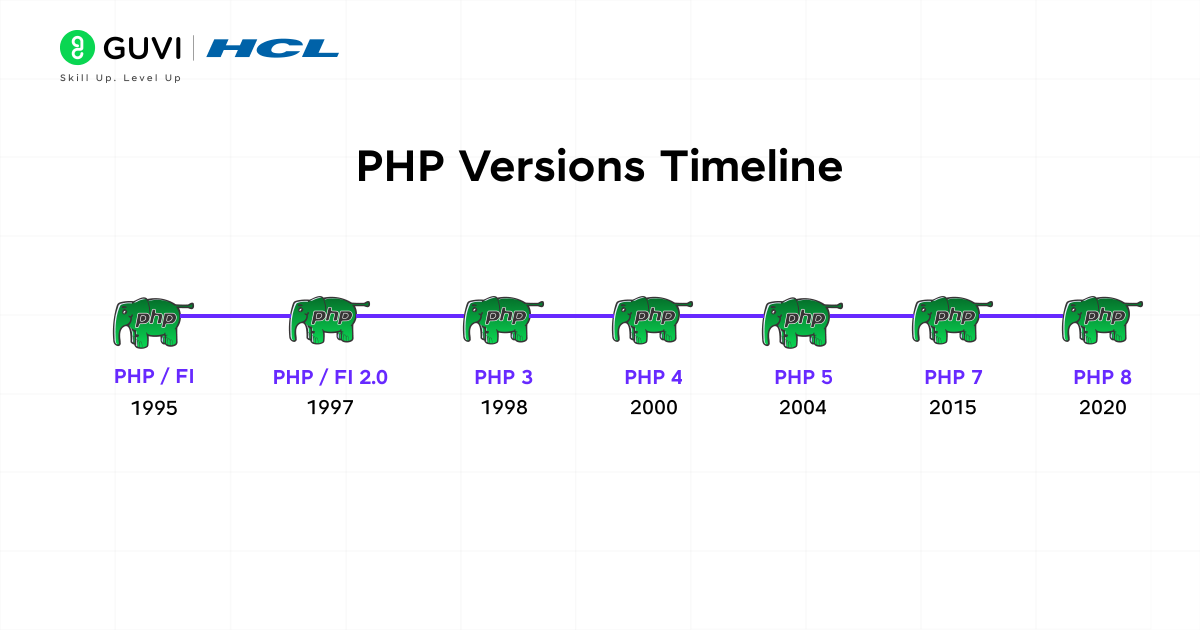
Since its inception, PHP has undergone several major revisions:
- PHP 3 (1998): Rewritten by Andi Gutmans and Zeev Suraski, introducing a more powerful and consistent language with better infrastructure for numerous databases, protocols, and APIs.
- PHP 4 (2000): Introduced the Zend Engine, significantly improving PHP’s performance and capabilities.
- PHP 5 (2004): Major improvements in object-oriented programming, XML support, and the introduction of PHP Data Objects (PDO) for consistent database access.
- PHP 7 (2015): A significant update that dramatically improved performance and reduced memory consumption.
- PHP 8 (2020): Introduced JIT compilation, named arguments, attributes, and other performance improvements and new features.
Each version has brought new features, improved performance, and better security, cementing PHP’s position as a robust and versatile language for web development.
If you are looking to learn Full Stack Development, you can join GUVI’s Full Stack Development Career Program with Placement Assistance. You will learn the MERN stack (MongoDB, Express.js, React, Node.js) and build real-life projects.
Key Features of PHP
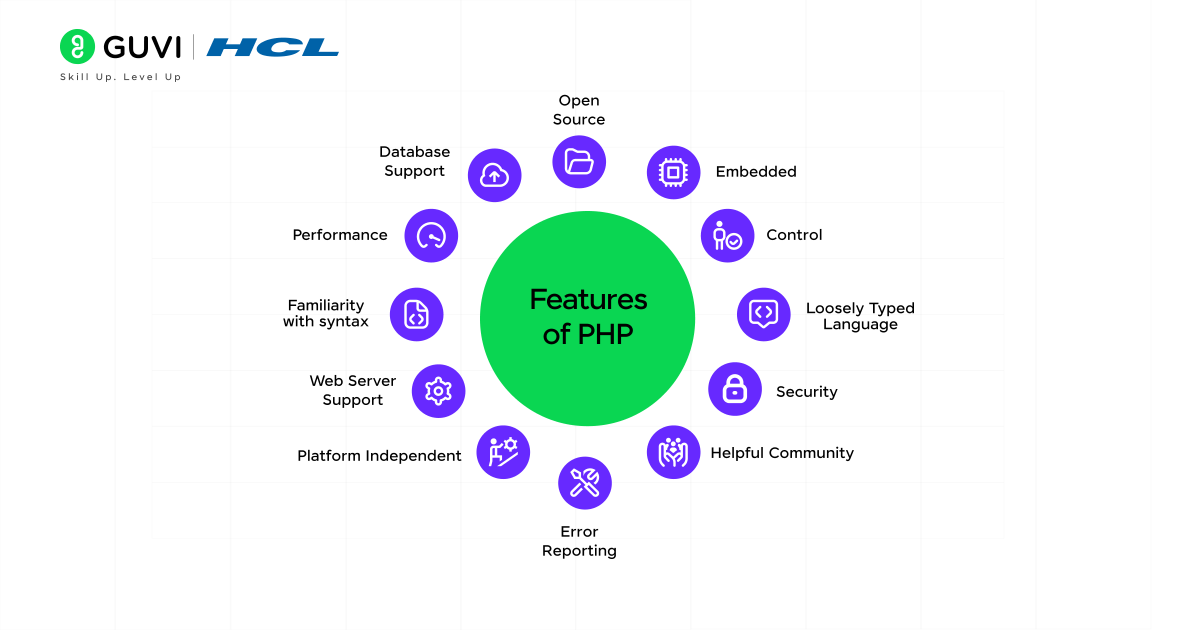
PHP’s popularity stems from its numerous features that make web development efficient and effective. Let’s explore some of these key features:
1. Easy to Learn and Use
PHP has a gentle learning curve, especially for those familiar with C, Java, or Perl. Its syntax is clear and functions are aptly named, making it intuitive for beginners.
2. Cross-Platform Compatibility
PHP can run on various operating systems, including Windows, Linux, Unix, and macOS. This versatility allows developers to work in their preferred environment and deploy applications across different platforms.
3. Database Integration
PHP offers native support for many popular databases. Its database integration capabilities, especially with MySQL, make it an excellent choice for data-driven websites.
4. Object-Oriented Programming Support
Since PHP 5, the language has robust support for object-oriented programming (OOP). This allows developers to create reusable, modular code, enhancing the maintainability and scalability of applications.
5. Extensive Library Support
PHP comes with a vast array of built-in functions for performing various tasks like file system operations, image processing, and more. Additionally, the PHP Extension and Application Repository (PEAR) provides a structured library of open-source PHP components.
6. Framework Availability
Numerous PHP frameworks like Laravel, Symfony, and CodeIgniter are available, offering structured environments for rapid application development.
7. Community and Documentation
PHP has a large, active community and extensive documentation. This means developers can easily find solutions to problems and stay updated with best practices.
8. Security Features
While security largely depends on the developer’s practices, PHP provides several built-in functions to enhance application security, such as password hashing and data sanitization methods.
How PHP Works
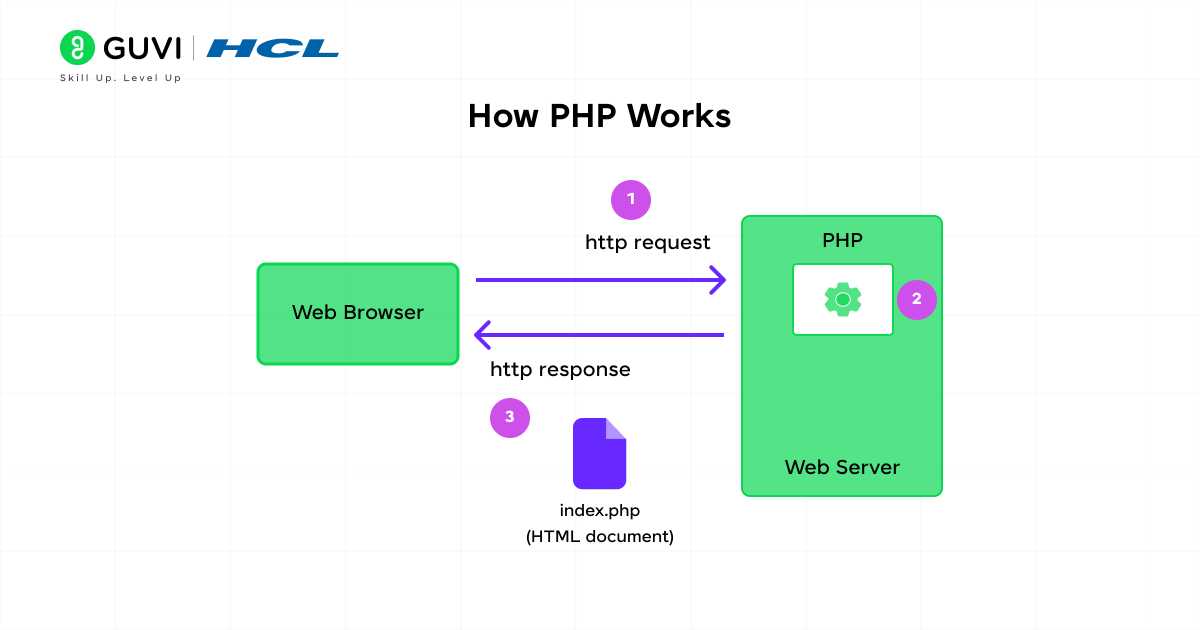
Understanding how PHP works is crucial for developers to effectively use the language. Here’s a simplified overview of the PHP execution process:
- Client Request: A user’s browser sends a request to the web server for a PHP page.
- Server Processing: The web server recognizes that the requested file is a PHP script and passes it to the PHP interpreter.
- PHP Execution: The PHP interpreter executes the PHP code in the script. This may involve database queries, file operations, or other server-side tasks.
- HTML Generation: The PHP interpreter generates HTML output based on the script’s instructions.
- Server Response: The web server sends the generated HTML back to the client’s browser.
- Client Display: The user’s browser displays the received HTML.
This server-side execution model allows PHP to perform complex operations and access server resources without exposing sensitive information or logic to the client.
Advantages of Using PHP
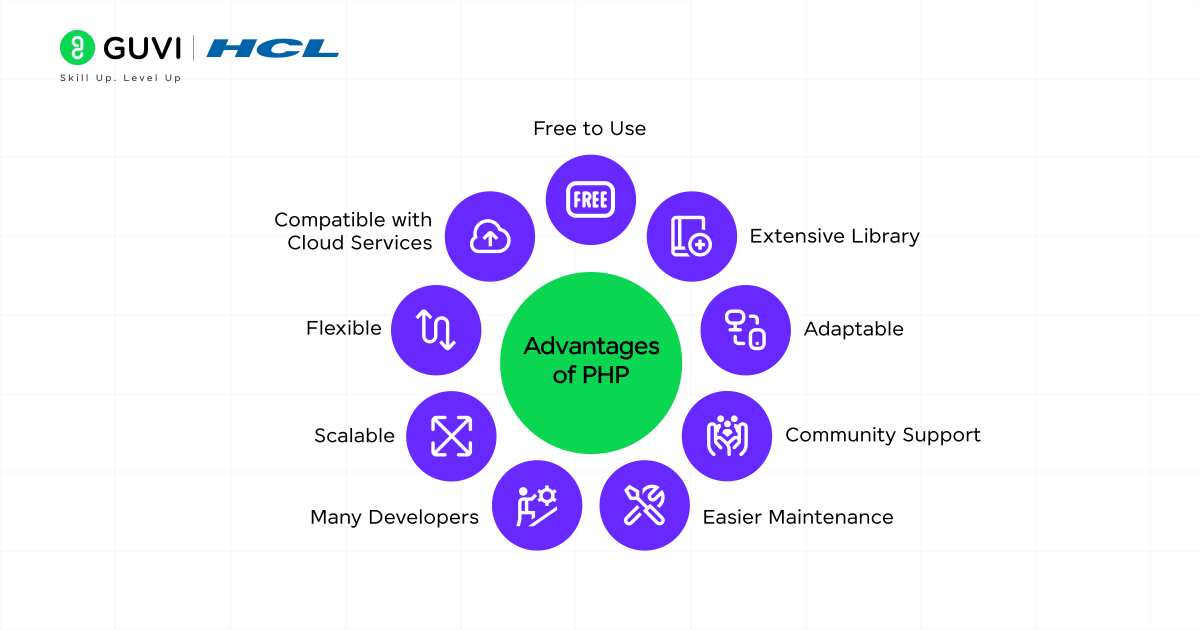
PHP’s enduring popularity in web development can be attributed to several key advantages:
1. Cost-Effective
As an open-source language, PHP is free to use and deploy. This significantly reduces development costs, especially for startups and small businesses.
2. Large Ecosystem
PHP has a vast ecosystem of frameworks, libraries, and tools. Popular frameworks like Laravel and Symfony provide robust foundations for building complex web applications quickly and efficiently.
3. Scalability
PHP applications can be easily scaled to handle increased traffic and data. Many high-traffic websites, including Facebook (which uses a PHP derivative called Hack), demonstrate PHP’s scalability.
4. Fast Development Cycle
PHP’s simplicity and the availability of numerous tools and frameworks allow for rapid development and prototyping. This is particularly beneficial in agile development environments.
5. Excellent Performance
With the introduction of PHP 7 and 8, the language has seen significant performance improvements. The new versions offer faster execution times and lower memory consumption.
6. Robust Security Features
While security ultimately depends on the developer, PHP provides several built-in functions and extensions to enhance application security. Regular updates also address potential vulnerabilities.
7. Flexibility
PHP can be used for various types of web development project ideas, from simple static websites to complex web applications and APIs.
8. Integration Capabilities
PHP easily integrates with various technologies and platforms, making it a versatile choice for diverse project requirements.
Common Uses of PHP
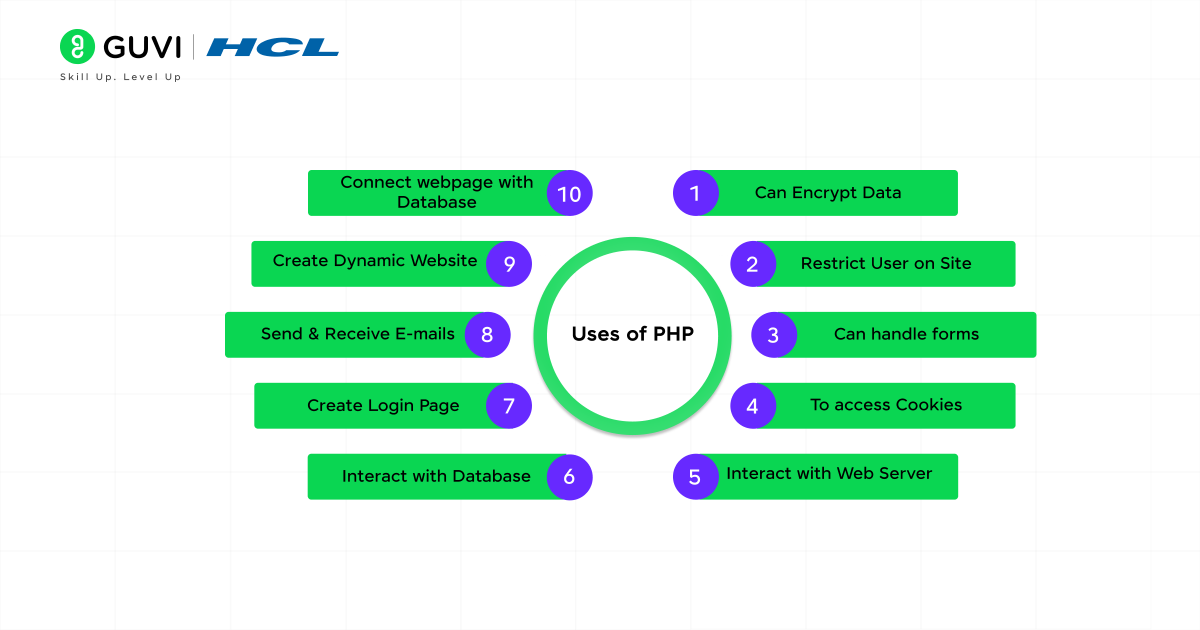
PHP’s versatility makes it suitable for a wide range of web development projects. Here are some common applications:
1. Content Management Systems (CMS)
Many popular CMS platforms like WordPress, Drupal, and Joomla are built using PHP. These systems allow users to easily create and manage website content without deep technical knowledge.
2. E-commerce Platforms
PHP powers many e-commerce solutions, including Magento and WooCommerce. Its ability to handle secure transactions and integrate with payment gateways makes it ideal for online stores.
3. Customer Relationship Management (CRM) Systems
PHP-based CRM systems like SugarCRM help businesses manage customer interactions and data throughout the customer lifecycle.
4. Web Applications
From social networking sites to productivity tools, PHP is used to build a wide variety of web applications. Its ability to handle dynamic content and user interactions makes it suitable for complex, interactive web apps.
5. RESTful APIs
PHP can be used to create RESTful APIs, allowing different systems to communicate and exchange data efficiently.
6. Data Processing and Analysis
PHP’s powerful data handling capabilities make it useful for processing and analyzing large datasets, often in conjunction with databases like MySQL.
7. Command-Line Scripting
While primarily used for web development, PHP can also be used for command-line scripting, allowing automation of various system administration tasks.
PHP vs. Other Programming Languages
To understand PHP’s position in the web development landscape, it’s helpful to compare it with other popular programming languages:
PHP vs. JavaScript
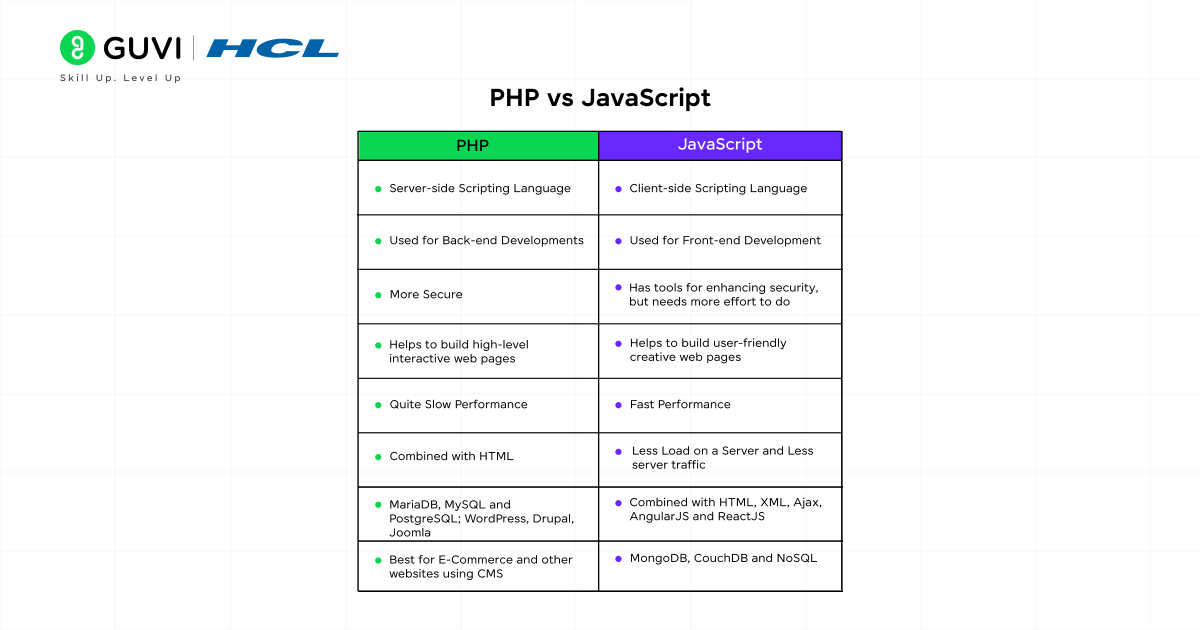
- Server-Side vs. Client-Side: PHP is primarily server-side, while JavaScript is primarily client-side (though Node.js allows server-side JavaScript).
- Execution: PHP code is executed on the server, while JavaScript typically runs in the user’s browser.
- Use Cases: PHP is mainly used for server-side logic and database interactions, while JavaScript is used for client-side interactivity and, with Node.js, server-side applications.
PHP vs. Python
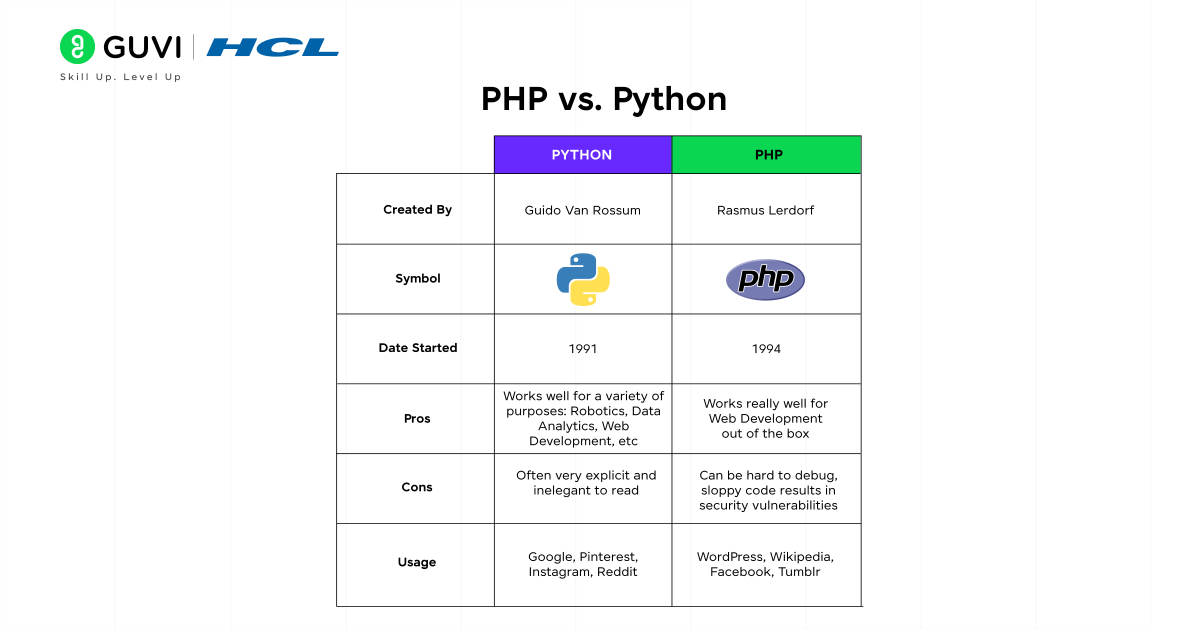
- Syntax: PHP has a C-like syntax, while Python uses indentation and is known for its readability.
- Use Cases: While both can be used for web development, Python is more versatile and is also popular in scientific computing, AI, and data analysis.
- Performance: PHP, especially newer versions, generally offers better performance for web applications.
PHP vs. Ruby
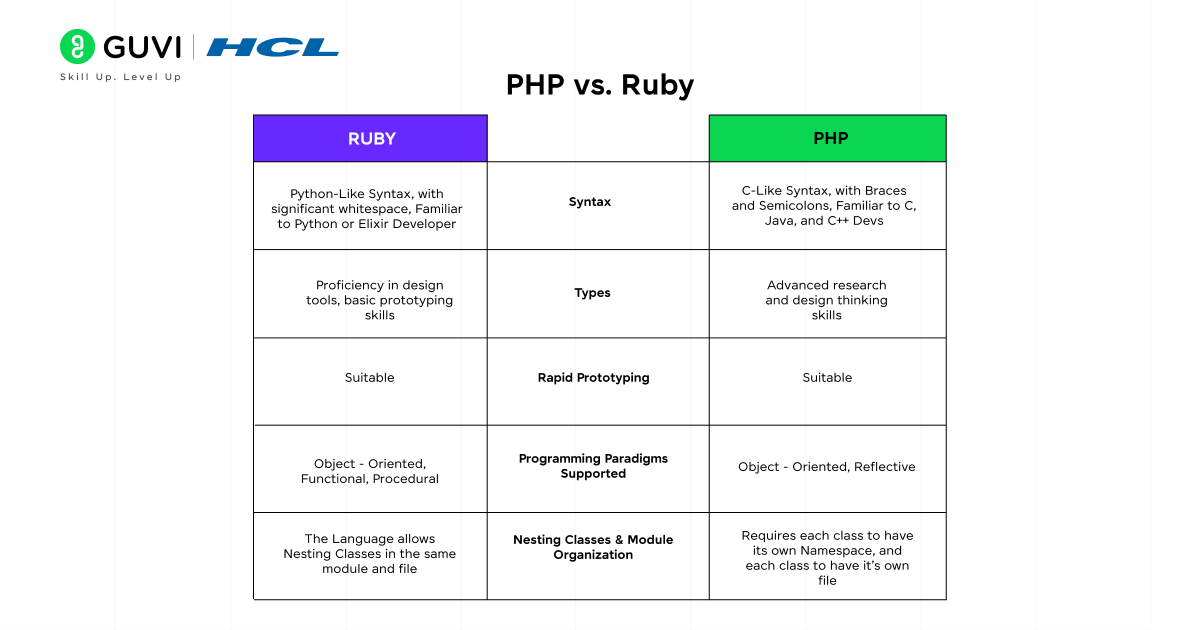
- Philosophy: Ruby emphasizes the principle of least astonishment, while PHP focuses on practicality for web development.
- Frameworks: Ruby on Rails is a popular framework for Ruby, comparable to Laravel for PHP.
- Learning Curve: PHP is generally considered easier to learn for beginners.
PHP vs. Java
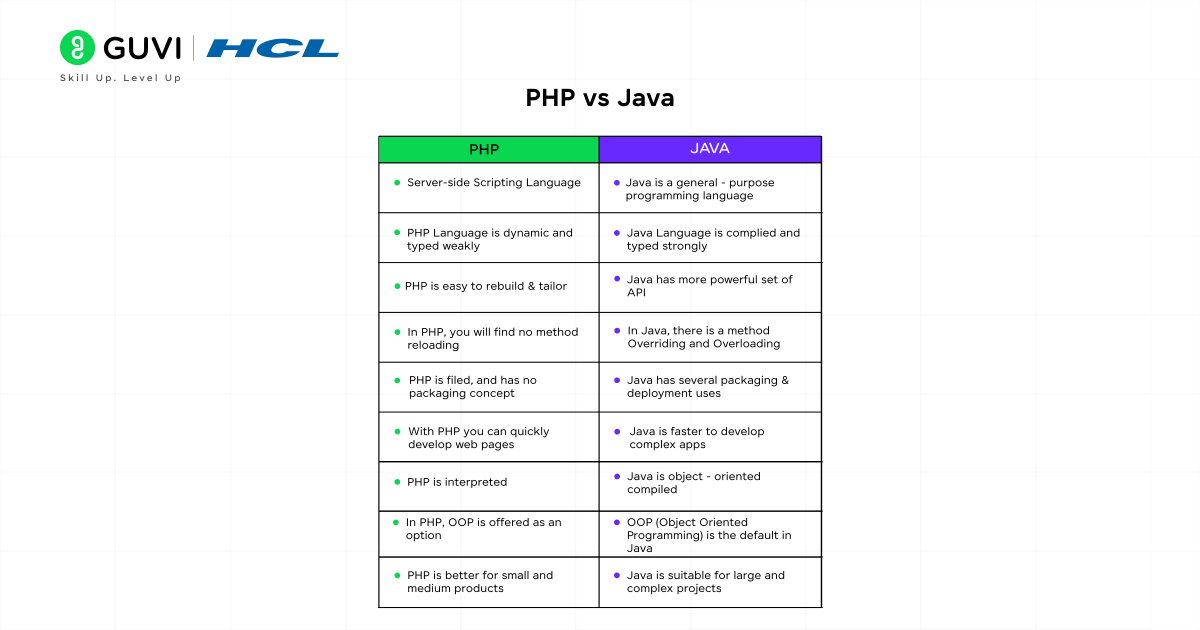
- Compilation: Java is compiled to bytecode, while PHP is interpreted (though it uses JIT compilation in recent versions).
- Type System: Java is statically typed, while PHP is dynamically typed.
- Enterprise Use: Java is more commonly used in large enterprise applications, while PHP is more popular in small to medium-sized web projects.
If you want to build dynamic websites and enhance your coding skills, enroll in GUVI’s PHP course today! Start now and create powerful, interactive web applications with ease.
Conclusion
As PHP continues to evolve, embracing new technologies and development paradigms, it’s clear that this venerable language will remain important in web development for years to come. PHP offers a rich, rewarding path to creating dynamic, interactive web experiences.
PHP’s adaptability, performance, and strong community support ensure its ongoing relevance and effectiveness. As we look to the future, PHP is well-positioned to meet the challenges of modern web development, continuing to empower developers and businesses in creating innovative, scalable, and robust web solutions.
FAQs
What is PHP?
PHP (Hypertext Preprocessor) is a widely-used, open-source scripting language designed primarily for web development. It is embedded within HTML and executed on the server side, generating dynamic web page content. PHP can interact with databases, handle sessions, and perform various server-side functions.
How does PHP work?
PHP works by embedding scripts within HTML code. When a PHP file is requested, the server processes the PHP code and executes it. The result is then sent to the client’s browser as plain HTML. PHP scripts are executed on the server, and the client only sees the final HTML output, not the PHP code itself.
What are the main features of PHP?
PHP offers key features like:
1. Server-Side Scripting: Runs on the server to generate dynamic content.
2. Database Integration: Connects to databases like MySQL and PostgreSQL.
3. Cross-Platform: Works on Windows, Linux, and macOS.
4. Open Source: Free to use with community support.
5. Flexible and Scalable: Suitable for both small projects and large web applications.
How does PHP compare to other programming languages for web development?
PHP vs. other web development languages:
1. Ease of Use: Beginner-friendly with plenty of resources.
2. Performance: Can be slower than alternatives, but recent updates improve speed.
3. Community Support: Strong community and frameworks like Laravel and Symfony.
4. Integration: Excellent database support and compatibility with most web hosts.
Is PHP still relevant in modern web development?
Yes, PHP remains relevant in modern web development. It powers a significant portion of the web, including popular platforms like WordPress, Drupal, and Joomla. Despite the emergence of newer technologies, PHP continues to evolve with regular updates that improve performance, security, and functionality, making it a viable choice for many web developers and projects.

























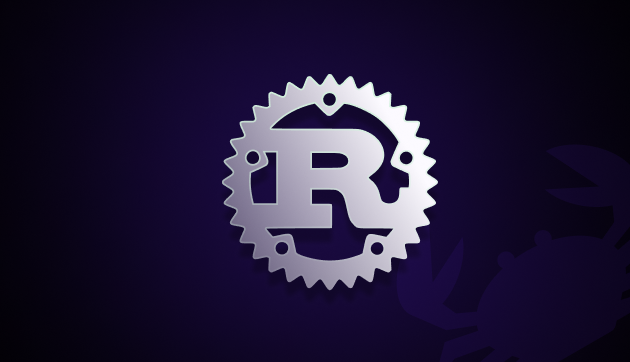

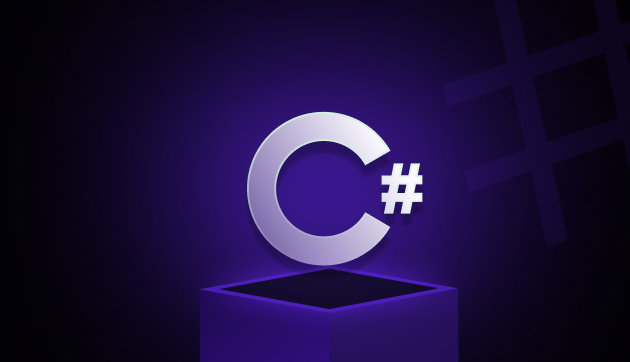
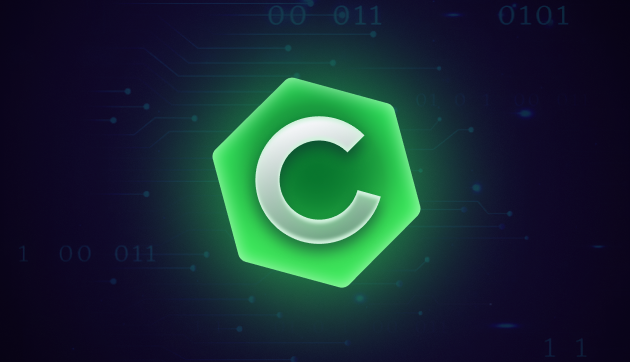



Did you enjoy this article?